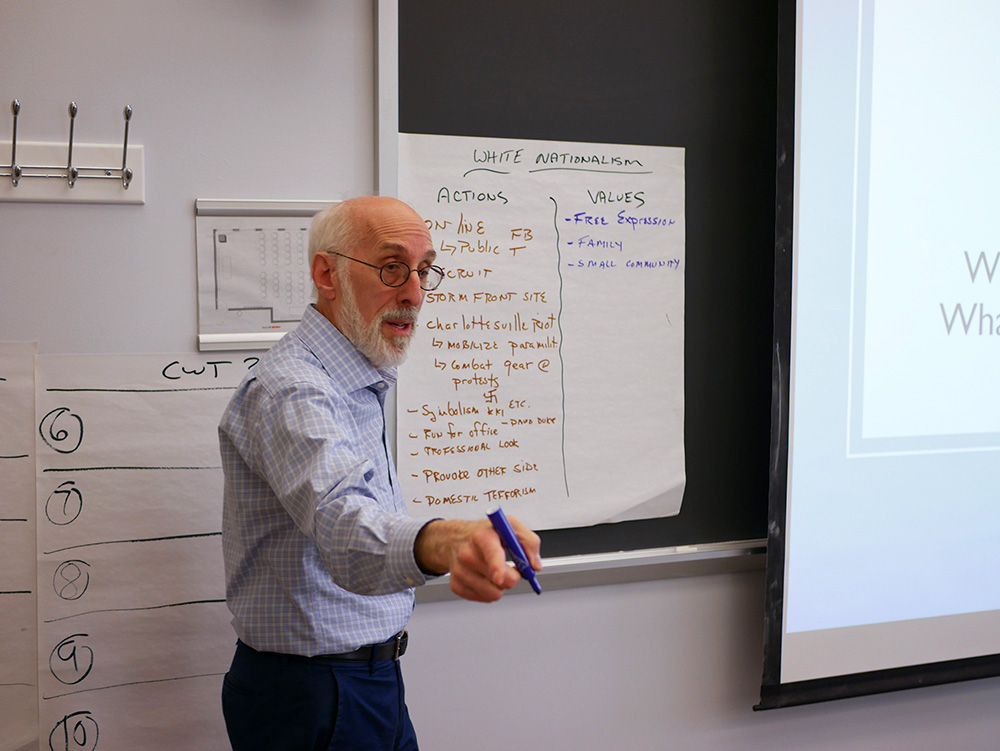The Stavros Niarchos Foundation Paideia program will offer courses next spring at Penn for the first time, touching on issues from civil discourse to Chinese-American history to the psychology of perseverance.
The four new classes aim to equip students with the tools to have meaningful and respectful discussions on complex political issues, the program’s faculty director, Michael Carpini, said.
“They are courses that we think are valuable in the spirit of Paideia, which means educating the whole person,” Carpini said. “We think they’re valuable in educating our students beyond their majors, beyond their professional aspirations.”
A $6 million donation from the Stavros Niarchos Foundation launched the five-year pilot program last spring. In addition to introducing a total of 12 new courses over the next three years, the Paideia program will co-sponsor lectures and roundtables throughout the spring and will also publish a website curating courses similar to those in the program.
The courses for next spring, which are open to all undergraduate students, include “Grit Lab: Fostering Passion and Perseverance in Ourselves and Others,” “Can We Talk? Courageous Civility For Troubled Times,” “Rhetoric and the Community,” and “The Chinese Body and Spatial Consumption in Chinatown.”
“Grit Lab” is taught by psychology professor Angela Duckworth. In this course, each student will identify a passion project to work on for eight weeks, such as learning a sport or musical instrument, in order to develop resilience and good habits to improve their skills, according to the course description. They will also learn about the emerging science of grit and long-term goals and create short TED Talk-inspired videos.
“The Chinese Body and Spatial Consumption in Chinatown” will take students to New York and San Francisco Chinatowns to examine how Chinese identity and narratives are shaped by these spaces and their histories, according to the course description. It is co-taught by design professor Kenneth Lum and English professor Chi-Ming Yang.
Lum said Chinese-American history is a “very under-taught area,” adding that people typically know about Chinese contributions in building the transcontinental railroad, but do not know anything beyond that.
Second-year Historic Preservation master’s student Sarah Lerner said she had not heard of the Paideia program before, but she decided to enroll in the Chinese history course after taking a course on Paris with Lum last year.
“I love the interdisciplinary approach that professor Lum takes. It really allows students to think critically but creatively about faith and objects,” said Lerner.
The last two courses focus on civil discourse, providing tools and developing skills for students to engage in productive conversation.
“Rhetoric and the Community” draws on classical rhetorical strategies, focusing on the argument’s logic and physical presentation, such as eye contact and gestures. Classical studies professor Jeremy McInerney has taught different iterations of the course before and said that it fits perfectly with the goals of Paideia.
“It’s based very clearly in the classics, but it’s not a class specifically on Greek or Latin classics,” McInerney said. “It’s rather trying to take similar lessons from that old tradition and to make rhetoric relevant to people today.”
McInerney and Center for the School Study Councils Director Harris Sokoloff, who is teaching “Can We Talk? Courageous Civility For Troubled Times,” both stressed the importance of civil discourse in democracy, especially in today’s polarized political climate.
Sokoloff’s course stems from a series of regional dialogues he co-founded called “Can We Talk,” which brings students across the ideological spectrum together to talk about politics. Students will lead and participate in these kinds of conversations in the course and will learn how to ask questions and peel back motivations in discussions.
“Civil discourse takes skill and it takes courage,” Sokoloff said. “Citizenship is not just about voting, it’s about what you do before you vote and after you vote—how do you talk to each other, how do you build relationships across differences.”
The Paideia program will also launch the Cohort Idea Fellows program next fall, where students can take Paideia courses, complete a senior project, and receive a certificate, Carpini said.

